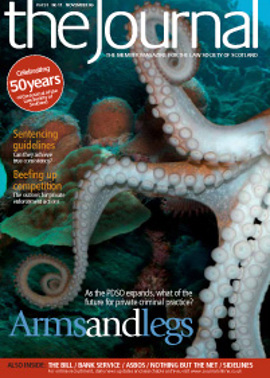Home and away

Vital work in Brussels
The volume of national legislation originating from the European Union is considerable. The figure is estimated to be as high as 60%, I was told when I visited the Society’s Brussels office with the Vice President. With such a volume of work to handle, the value of the office is clear. It is very active on law reform and provides a vital lobbying service, ensuring that the views of the Scottish legal profession are known at the heart of the EU institutions.
Individual solicitors have benefited from the services it provides, for instance, in accessing EU, EC and European Court papers, publications and judgments. With so many European policies directly affecting the advice that solicitors give their clients, this advisory role should not be underestimated.
Professional regulation is under the Commission’s scrutiny and that work is closely monitored. Likewise, it is focusing on cross-border aspects of criminal law, and will soon consider proposals on conveyancing practice across member states. The value of the office will therefore continue to be evident in the months ahead. Of course, the engagement of solicitors, particularly those with expertise in areas of law under scrutiny, will remain important. I would like to remind members that the “Brussels Agenda” newsletter is available on the Society’s website and provides further information about the work of the Brussels office.
The bill saga continues
Detailed reports about the progress of the Legal Profession and Legal Aid (Scotland) Bill continue in this edition of the Journal. The number of amendments tabled – around 650 with the vast majority put forward by the Scottish Executive – is evidence, if any were required, that the bill is in need of substantial change. It is heartening that the Executive has recognised some of the obvious flaws in the legislation, but worrying too that they have introduced new measures without any consultation, and that many important amendments have not been made.
A number of the Executive’s amendments attempt to ensure that the bill is compatible with the European Convention on Human Rights, although the Society’s view is that they have failed to go far enough. It is encouraging that solicitors exonerated in a complaint will no longer be forced to pay a case fee. However, it is extremely worrying that a proposed new process could lead to the Society or Faculty of Advocates being held in contempt of court – with the President or Dean facing the possibility of imprisonment or a fine – for failing to comply with a recommendation of the Scottish Legal Complaints Commission. It is also suggested that, where an individual complaint is concerned, the details of the practitioner involved – but not the complainer – may be published if it is considered an exceptional case and in the public interest. It seems to have been overlooked that these sanctions would involve highly subjective, and potentially damaging, decisions being made.
The Society’s bill team will continue to meet, listen, inform and advise the profession, the Justice 2 Committee, the Executive and stakeholders. We will do whatever we can to make the bill workable in practice and achieve its original aims of an effective, independent, service complaints-handling body. The unity and strength of feeling expressed by the profession and the Society have helped to achieve valuable concessions and progress to date, but there is a very long way to go. That sense of propose will be required once again as we enter stage 3 of the parliamentary process if we are to ensure that further changes are made to this flawed bill.
Nurturing talent
The Society’s continuing professional development initiative, CPD Online, has been praised by the profession as accessible, convenient and cost-effective. I am among its many supporters and I am delighted that efforts are also being made to produce further training DVDs following their successful introduction last year. Both these initiatives allow more solicitors to benefit from the flexibility of distance learning, and those in rural areas, in particular, are keen to take advantage of this expanding service. Other professions are increasingly turning to web-based training and it is important that solicitors remain at the forefront of such innovation. Graduates and trainees are used to virtual classrooms and internet study aids. We must create an environment that continues to attract the brightest and best new talent.
Some of the solicitors of tomorrow will be taking part in the Society’s Donald Dewar Debating Tournament, which begins in November. The annual schools competition has become the largest of its kind in Scotland, and the DVD from last year’s final in the Scottish Parliament has been sent to all Scottish secondary schools. This year’s tournament is set to be bigger and better than ever, with even more young people encouraged to take an active interest in current affairs and the Scottish political process, something I am sure we all wholeheartedly encourage for the future.
In this issue
- Home and away
- The importance of kinship care
- Growing arms and legs
- Changing its spots?
- Guiding hand
- Trustbusters unite
- Closing the books
- Spam: the managed solution
- Nothing like Nothing but the Net!
- Banking on service
- You want certified?
- Enough is enough
- Provision and prejudice
- Work and families
- Cash trapped
- Man of business
- Scottish Solicitors' Discipline Tribunal
- Website reviews
- Book reviews
- Sale questionnaire to be tested
- So long, and thanks for all the fizz
- ASBO, the young misfit






